Twitter’s parent company, X Corp, has instigated a lawsuit against a non-profit entity devoted to combating online hate in response to their critique of the social media platform.
With operations in the US and UK, the Center for Countering Digital Hate (CCDH) is accused by X Corp of engaging in “illegal acts” to access its data illegitimately.
In a counter statement, CCDH aimed Elon Musk, the owner of X Corp, alleging that he’s seeking to suppress criticisms directed at him. Musk openly describes himself as a “free-speech absolutist,” previously dismissed similar claims.
CCDH, a non-profit, undertakes research and spearheads campaigns against digital hate, with its reports regularly featuring in major media outlets such as the BBC. Its UK board includes Conservative MP Damian Collins.
Collins, a former minister, voiced his surprise at Musk’s actions, equating it to a ‘lawfare’, a scenario where a powerful organization bullies a smaller one.
In the US, a joint letter to Musk from Congress members Lori Trahan, Adam Schiff, and Sean Casten argued that Musk’s lawsuit against CCDH obstructs unbiased research in the public interest.
Imran Ahmed, CCDH’s CEO, compared Musk’s recent legal threat to authoritarian strategies, contending that Musk won’t hesitate to silence his detractors.
Ahmed asserted that the platform had become a hotbed for hate and misinformation under Musk’s stewardship. He interpreted Musk’s lawsuit as an effort to “shoot the messenger.”
The lawsuit, filed on Monday, was revealed after a heated exchange of legal letters. Alex Spiro, X Corp’s attorney, penned the initial warning of legal action, followed by a resolute reply from CCDH’s US attorney, Roberta Kaplan.
In response to the legal threat, Ian Russell, father of CCDH UK board member Molly Russell, termed Musk’s legal maneuver an “unprecedented attack on civil society.”
Russell found Musk’s aggressive strategy astonishing, particularly at a time when Twitter appears to be sliding backwards in controlling harmful content.
Musk had asserted that hate speech on the platform had dropped by one-third since his acquisition.
New Accusations
Whereas Spiro’s letter alluded to perceived inaccuracies in CCDH’s research (denied by CCDH), the lawsuit filed on Monday in the US District Court for the Northern District of California introduced new charges.
The lawsuit seeks unspecified damages from CCDH, alleging that the organization’s critical reports caused X Corp to lose “tens of millions of dollars” in ad revenues.
The lawsuit also suggests possible amendments incorporating CCDH’s backers, potentially including “foreign governments with ties to legacy media companies,” once their identities are determined.
CCDH has published several reports criticizing X, the company formerly known as Twitter. One such piece of information, which drew legal criticism from Spiro, alleged Twitter’s failure to address 99% of hateful posts from Twitter Blue subscribers.
The lawsuit challenges CCDH’s research methods and conclusions, alleging that the organization “intentionally and unlawfully” scraped data from X, violating its terms of service.
The lawsuit further accuses CCDH of using Brandwatch, a software tool designed to monitor social media conversations about brands, to gain “unauthorized” access to X’s data through a third party.
The lawsuit also argues that CCDH aimed to suppress differing views on issues like Covid-19 vaccines, reproductive healthcare, and climate change.
The lawsuit claims that CCDH’s reports led to several companies suspending their ongoing advertising spend on X.
As the legal drama progresses, it focuses on essential issues related to the power dynamics between large corporations and advocacy groups, as well as the responsibility of social media platforms for their content. Regardless of the verdict, this case will likely set significant precedents for free speech, the battle against online hate, and the future trajectory of data privacy in social media.







